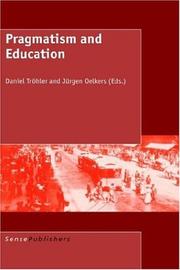Book
ISBN: 3110304430 9783110304435 Year: 2013 Publisher: Berlin De Gruyter
Abstract | Keywords | Export | Availability | Bookmark
 Loading...
Loading...Choose an application
- Reference Manager
- EndNote
- RefWorks (Direct export to RefWorks)
Der fünfte Band der Briefe an Pestalozzi umfasst die Zeit von August 1817 bis 1820 und damit eine Zeit mit grassierender Armut sowie die Jahre des Durchbruchs der Restauration vor allem in Preussen. Diese Ereignisse prägten auch die Korrespondenz Pestalozzis. Überdeckt wurde die Krise durch die zahlreich eingehenden Briefe zur erfolgreichen Subskription von Pestalozzis gesammelten Werken. Die politisch, wirtschaftlich und persönlich turbulente Zeit war auch dadurch gekennzeichnet, dass Pestalozzi nach vielen erfolglosen Versuchen wieder eine Armenanstalt - in Yverdons Vorort Clindy - eröffnen konnte und eine intensive Rezeption seiner Methode in England und Irland begann. Und tatsächlich: Die Schülerzahlen stiegen wieder an, und es kam zu einer eigentlichen "englischen Kolonie" in Yverdon. Zudem verschob sich das Interesse in den Osten und Südosten Europas sowie in die aufstrebenden industrialisierten Regionen des Niederrheins.
Educators --- Educationalists --- Educationists --- Faculty (Education) --- Specialists --- Pestalozzi, Johann Heinrich, --- Pestalozzi, Johann --- Pestalozzi, J.H. --- Pestalozzi, Jan Henryk --- Pestalozzi, Johann Heinrich. --- education.

ISBN: 1281104930 9786611104931 9087903553 9077874658 9077874070 9789077874073 Year: 2005 Publisher: Rotterdam ; Taipei : Sense Publishers,
Abstract | Keywords | Export | Availability | Bookmark
 Loading...
Loading...Choose an application
- Reference Manager
- EndNote
- RefWorks (Direct export to RefWorks)
The papers in this book have emerged from a conference which was organized in Zurich in 2003 by the Pestalozzianum Research Institute for the History of Education and the Educational Institute of the University of Zurich. The conference was organized in light of the increasing internationalization of educational discussion within the last ten to twenty years and the topic was the relation between pragmatism and educational theory. The contributions appear in a kind of chronological order. First, James A. Good examines the repeatedly asserted Hegelian roots of Dewey’s philosophy, while Hans-Peter Krüger, Meike Sophia Baader, and Roswitha Lehmann-Rommel address specific aspects of pragmatism, such as public communication, religion, and aesthetics, with the main emphasis of the analysis on William James and John Dewey. Jane Addams’ and George Herbert Mead’s education stands at the center of interest in the contributions by Daniel Tröhler, Birgit Althans, Gert Biesta, and Jürgen Oelkers, while Philipp Gonon and Stefan Bittner turn to the question of why pragmatism had such a hard time of gaining a foothold in Germany. The final contribution, Philip W. Jackson’s systematic analysis of Dewey’s thought, breaks with the chronological perspective of the volume, shifting the focus to other central and fruitful issues.
Pragmatism. --- Education --- Idealism --- Knowledge, Theory of --- Philosophy --- Philosophy, Modern --- Positivism --- Realism --- Utilitarianism --- Experience --- Reality --- Truth --- Philosophy. --- Aims and objectives. --- Aims and objectives of education --- Educational aims and objectives --- Educational goals --- Educational objectives --- Educational purposes --- Goals, Educational --- Instructional objectives --- Objectives, Educational --- Purposes, Educational --- Educational sociology --- Education - Philosophy --- Pragmatism
Book
ISBN: 3037550465 Year: 2005 Publisher: Zürich : Pestalozzianum,
Abstract | Keywords | Export | Availability | Bookmark
 Loading...
Loading...Choose an application
- Reference Manager
- EndNote
- RefWorks (Direct export to RefWorks)
Book
ISBN: 3781514986 Year: 2006 Publisher: Bad Heilbrunn : Klinkhardt,
Abstract | Keywords | Export | Availability | Bookmark
 Loading...
Loading...Choose an application
- Reference Manager
- EndNote
- RefWorks (Direct export to RefWorks)
Digital
ISBN: 9789460918278 Year: 2011 Publisher: Rotterdam SensePublishers
Abstract | Keywords | Export | Availability | Bookmark
 Loading...
Loading...Choose an application
- Reference Manager
- EndNote
- RefWorks (Direct export to RefWorks)
Book
ISBN: 3907526929 Year: 2001 Publisher: Zürich Pestalozzianum
Abstract | Keywords | Export | Availability | Bookmark
 Loading...
Loading...Choose an application
- Reference Manager
- EndNote
- RefWorks (Direct export to RefWorks)
Book
Abstract | Keywords | Export | Availability | Bookmark
 Loading...
Loading...Choose an application
- Reference Manager
- EndNote
- RefWorks (Direct export to RefWorks)
Book
ISBN: 3258049289 Year: 1994 Publisher: Bern : Haupt,
Abstract | Keywords | Export | Availability | Bookmark
 Loading...
Loading...Choose an application
- Reference Manager
- EndNote
- RefWorks (Direct export to RefWorks)
Book
ISBN: 9789460918278 Year: 2011 Publisher: Rotterdam SensePublishers
Abstract | Keywords | Export | Availability | Bookmark
 Loading...
Loading...Choose an application
- Reference Manager
- EndNote
- RefWorks (Direct export to RefWorks)
For nearly half a century, research on education systems has been increasingly popular. However, this popularity was long restricted primarily to internationally linked policy makers and education planners, often backed up by international organizations such the OECD but also by governmental or para-governmental organizations within the individual countries. These institutional affiliations provided education research with a specific character that often centres on notions such as excellence, efficiency, or standards. The specific comparative character of this policy-driven research agenda triggered the development of suitable research techniques such as comparative statistics and pertinent sub-disciplines such as cognitive psychology. Backed-up by powerful global institutions, this agenda purported to be rather unique, and it tended to ignore the cultural complexity of the educational field and those research approaches that address this complexity. This volume includes different historical, cultural, and sociological approaches to the education systems and to questions as to how research on education systems can be undertaken beyond the parameters of the existing research agenda. They demonstrate how pertinent problems of research on education systems can only be tackled taking an international and interdisciplinary approach with regard to both research questions and methods concerning education systems.
Book
ISBN: 9789811630095 9789811630101 9789811630118 9789811630088 Year: 2021 Publisher: Singapore Springer Singapore :Imprint: Springer
Abstract | Keywords | Export | Availability | Bookmark
 Loading...
Loading...Choose an application
- Reference Manager
- EndNote
- RefWorks (Direct export to RefWorks)
Curriculum development --- Teaching --- Educational sciences --- vergelijkende pedagogiek --- onderwijs --- curriculumontwikkeling --- onderwijsonderzoek

 Search
Search Feedback
Feedback About UniCat
About UniCat  Help
Help News
News